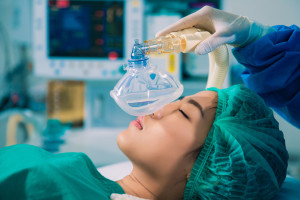
Ever since Joan Rivers’ passing, I have several friends who have expressed concerns about having any kind of procedure which would require having to undergo anesthesia. Rivers, who was notorious for the number of cosmetic surgeries she’d amassed, ironically did not fall ill while having a cosmetic surgery procedure- rather while having an endoscopic one. Rivers died on September 4, 2014, a week after she underwent a procedure at Manhattan’s Yorkville Endoscopy clinic. A report by The Centers of Medicare & Medicaid Services in November found the clinic failed to consistently document the dose of propofol, a sedative that was administered to Rivers. The clinic also committed a number of other serious mistakes.
And while her death is tragic, what none of us know is just how much research Rivers did before she decided to have a procedure performed at this specific clinic. For instance; did she know the risks associated with different types of anesthesia and did she ask the right questions? If anything, her death should not deter one from getting a procedure of any kind, rather, it should empower each and every one of us to be our own patient advocate.
Knowledge is power, and despite this tragedy, fatalities from general anesthesia are relatively rare because of modern monitoring used by board-certified anesthesiologists. With that in mind Dr. Robert Tornambe, a board certified plastic surgeon based in New York City, shares some basic information about anesthesia options which are commonly used in cosmetic surgery.
1. What are the risks of local anesthesia and general anesthesia?
Risks of local anesthesia are essentially none. Some people believe that they are allergic to lidocaine with epinephrine because they experience palpitations from the epinephrine, which is a normal and temporary experience. Women who are pregnant or breast feeding should consult with their obstetrician/gynecologist, prior to receiving local anesthesia.
Risks from general anesthesia range from respiratory problems to cardiac and even allergic reactions. However, significant incidents are much rarer because of vast improvement in monitoring technology used by anesthesiologists. Patients with known medical problems should be seen by their primary care physician prior to general surgery.
2. When is it absolutely necessary to use general anesthesia in plastic surgery?
Usually general anesthesia is required in longer operations, requiring minimal movement of the patient during surgery. Some anesthesiologists prefer general anesthesia in longer operations because it is actually safer; they have control of the patient’s airways and can give more medication to keep the patient comfortable. Abdominoplasty is one operation where general anesthesia is commonly used.
3. What is the difference between local anesthesia and regional anesthesia and when do you use regional anesthesia?
Local anesthesia means that the anesthetic is injected into the area in and surrounding the surgical area. It is also sometimes called regional anesthesia, which is technically incorrect. True regional anesthesia is actually some sort of “nerve block” in which the anesthetic is injected around a major nerve that affects or controls pain to a particular surgical site. It is commonly used in hand surgery, where nerves to the hand are easily “blocked”.
4. What procedures require only local anesthesia?
Many surgical procedures can be used with ONLY local anesthesia. Many times sedatives are used concurrently to ease patient agitation, but it is not required in many procedures. Operations like upper eyelid/ blepharoplasty, small areas of liposuction and removal of small skin lesions can be done with local anesthetic only.
5. What type of anesthesia is necessary for liposuction?
As I stated, small regions, like Submental (under the chin) liposuction can be performed under strict local anesthesia. However, for larger regions or multiple areas, patients are much more comfortable with IV sedation added to the local area.
Armed with these anesthesia basics, you can feel more at ease discussing your options with your board-certified plastic surgeon and more specifically which type of anesthesia will be used for your next cosmetic procedure.
This post originally appeared on Smart Beauty Guide
Questions or want to talk to Dr. Tahernia?
Give us a call: (310) 614-9701